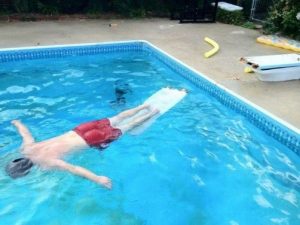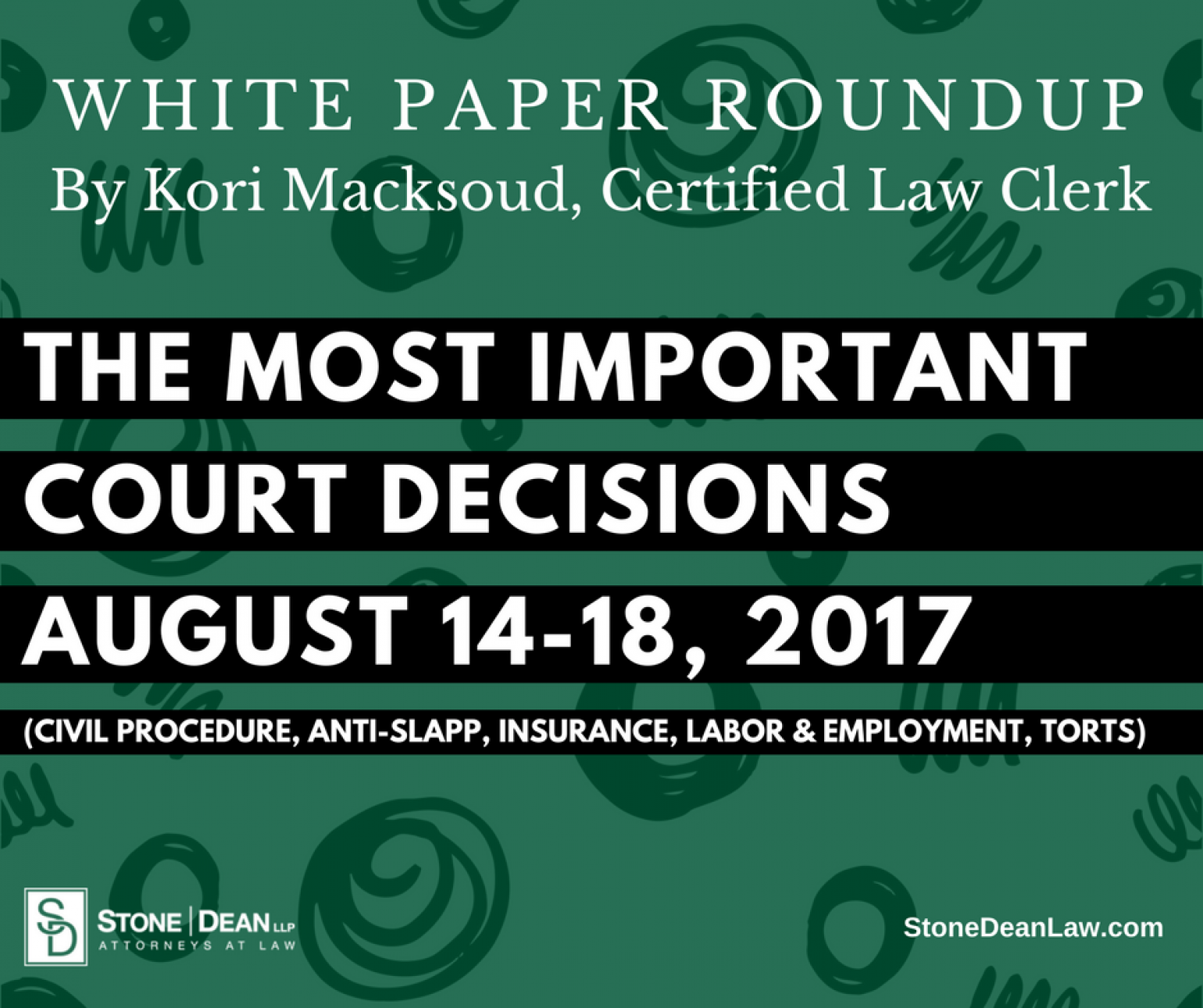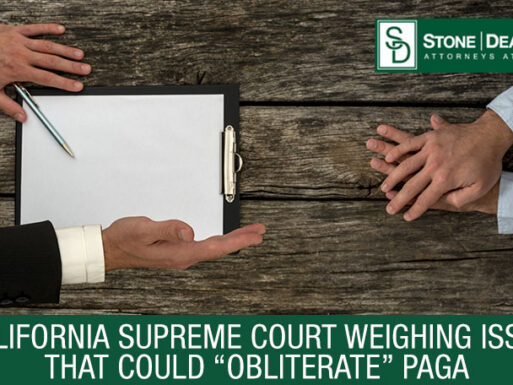The Most Important California Court Decisions for the week of August 14-18, 2017
(Civil Procedure, Insurance, Labor & Employment, and Torts)
By Kori Macksoud
We are making it easier for you to stay updated on all the latest California Court case decisions by bringing our quarterly White Paper to the Cutting Edge Blog! Now you’ll be able to read up on last week’s most important decisions related to SD’s practice groups.
Stone | Dean’s quarterly court-decisions White Paper, specially prepared by Kori Macksoud, is jam-packed with all the most important court decisions in business, insurance, employment, and more! Find our library of white papers available for download by clicking here.
Civil Procedure (Anti-SLAPP)
Okorie v. Los Angeles Unified School District
August 16, 2017
(2017) Cal. App. LEXIS 712
Full text: https://scholar.google.com/scholar_case?case=6519079916329320648&hl=en&as_sdt=6&as_vis=1&oi=scholarr
Dioka Okorie sued his former employer, Los Angeles County Unified School District (“LAUSD”), and two of his supervisors, (collectively, “Defendants”) alleging, among other things, discrimination, harassment, and retaliation. In response, defendants filed a special motion to strike the complaint pursuant to Code Civil Procedure § 425.16, the anti-SLAPP (strategic lawsuit against public participation) statute.
The trial court granted the anti-SLAPP motion. The trial court found that the Okorie’s claims were subject to the anti-SLAPP statute because the gravamen of the complaint related to protected communicative conduct by LAUSD related to an internal investigation regarding molestation allegations made against Okorie. As such, the trial court determined that Okorie failed to make a prima facie showing of the core contentions in his complaint.
The Court of Appeal affirmed the order. The Court held that it was clear from Okorie’s allegations that defendants’ speech and communicative conduct regarding an internal investigation of molestation allegations were integral to the complaint and each cause of action alleged therein. As such the Court determined that the principal thrust or gravamen of the complaint and its component causes of action was protected speech or communicative conduct.
Accordingly, the Court found that defendants met their threshold burden of showing that Okorie’s claims arose out of protected activity that was not incidental to the claim. Therefore, Okorie did not show a probability of prevailing on any of his claims.
Ponte v. County of Calaveras
Filed July 17, 2017, publication ordered August 15, 2017
(2017) Cal. App. LEXIS 710
Full text: https://scholar.google.com/scholar_case?case=851185993805382985&hl=en&as_sdt=6&as_vis=1&oi=scholarr
Dennis Ponte demanded County of Calaveras (“County”) to pay him over $150, 000 to reimburse him for work purportedly performed on the County’s behalf pursuant to an oral contract. After multiple sustained demurrers and Ponte’s apparent disregard for pertinent legal authority demonstrating that his claims lacked merit, the trial court granted summary judgment to the County. The court later awarded substantial attorney’s fees, finding Ponte’s claims, including those based on promissory estoppel, were not brought or maintained in both subjective and objective good faith. Ponte appealed.
000 to reimburse him for work purportedly performed on the County’s behalf pursuant to an oral contract. After multiple sustained demurrers and Ponte’s apparent disregard for pertinent legal authority demonstrating that his claims lacked merit, the trial court granted summary judgment to the County. The court later awarded substantial attorney’s fees, finding Ponte’s claims, including those based on promissory estoppel, were not brought or maintained in both subjective and objective good faith. Ponte appealed.
The Court of Appeal affirmed the judgment. The Court held that allowing promissory estoppel for work plaintiff purportedly performed on the county’s behalf pursuant to an oral contract would have undermined ordinances setting rules for public contracts, which in part is to preclude oral contract claims; therefore, this was not an exceptional case that required the application of estoppel against the county.
Accordingly, the Court held that the trial court properly found that no reasonable attorney would have thought Ponte’s claims against the county made were legally tenable; therefore, an award of defense costs to the county pursuant to Code of Civil Procedure § 1038, was appropriate.
Insurance Law
Hovannisian v. First American Title Insurance Company
Filed July 25, 2017, publication ordered August 11, 2017
(2017) Cal. App. LEXIS 701
Full text: https://scholar.google.com/scholar_case?case=17231849875855443253&hl=en&as_sdt=6&as_vis=1&oi=scholarr
David and Linda Hovannisian purchased property from Wells Fargo Bank (“Wells Fargo”) at a foreclosure sale. Several months later they discovered there was a first priority deed of trust on the property that had not been extinguished by the foreclosure. The Hovannisians sued Wells Fargo for intentional and negligent misrepresentation based on a statement in Wells Fargo’s deed of trust that it was a first deed of trust.
Wells Fargo tendered defense of the action to its title insurer, First American Title Insurance Company (“First American”), which refused to indemnify or defend Wells Fargo. After Wells Fargo assigned any claim it had against First American to the Hovannisians, the Hovannisians sued First American for breach of contract and breach of the implied covenant of good faith and fair dealing. First American subsequently  brought a summary judgment motion, arguing that coverage had terminated, there were no benefits due under the policy, and there was a genuine dispute as to coverage. The trial court granted the motion. The Hovannisians appealed.
brought a summary judgment motion, arguing that coverage had terminated, there were no benefits due under the policy, and there was a genuine dispute as to coverage. The trial court granted the motion. The Hovannisians appealed.
The Court of Appeal affirmed the judgment, concluding that the loss or damage claimed in the underlying action was not a loss or damage covered by the title insurance policy. Because the Hovannisians did not identify any other facts or allegations presented to the title insurer that might have given rise to a duty to defend, they could not state a claim that was adverse to the Wells Fargo’s title or interest because they received an unwarranted deed after a public auction. As such, the Hovannisian’s only potential cause of action was for misrepresentations made during the foreclosure process.
Since the first deed of trust did not pose a threat to Wells Fargo’s title or interest, as it no longer had an interest in the property after the foreclosure, the Hovannisians could not state a claim for an insured title loss under the facts and circumstances they raised. As there was no potential for coverage under the policy or a duty to defend, the Hovannisian’s breach of contract claim was without merit.
Accordingly, because the trial court determined as a matter of law that the policy provided no coverage for the claims asserted in the underlying action, there could not be a bad faith claim as a matter of law.
Labor and Employment
Merrick v. Hilton Worldwide, Inc.
August 16, 2017
(2017) U.S. App. LEXIS 15374
Full text: https://scholar.google.com/scholar_case?case=12291685808803574527&hl=en&as_sdt=6&as_vis=1&oi=scholarr
Charles Merrick was sixty years old in July 2012, when he was terminated from his position as Director of Property Operations at the Hilton La Jolla Torrey Pines Hotel (“the Hotel”) as part of a reduction-in-workforce (“RIF”). Merrick began his career in hotel operations as a maintenance mechanic for Sheraton Hotels in Chicago. He rose through the ranks to become Director of Engineering. In 1993, Sheraton transferred Merrick to the Sheraton Grande Torrey Pines, La Jolla. When Hilton acquired the Hotel five years later, it kept Merrick on, first as Director of Hotel Operations and then as Director of Property Operations. By 2012, Merrick had logged nineteen years at the Hotel.
Due to declining revenues, the Hotel underwent a series of RIFs beginning in 2008, with strict guidelines regarding which positions were to be eliminated. Ultimately, Merrick’s position, Director of Property Operations, was recommend for elimination.
Subsequently, Merrick raised six claims against the Hotel: wrongful termination based on age, in violation of the California Fair Employment and Housing Act (“FEHA”); age discrimination in violation of public policy; failure to prevent age discrimination; wrongful termination due to physical disability; and two counts of failure to prevent disability discrimination. The District Court granted summary judgment on all six claims. Merrick appealed only the age discrimination claims.
The Court of Appeal affirmed the District Court’s summary judgment in favor of the Hotel. The Court applied the three-part McDonnell Douglass burden-shifting test to analyze Merrick’s age discrimination disparate treatment claims under the California Fair Employment and Housing Act (“FEHA”).
- First, the Court held that Merrick satisfied the elements for establishing a prima facie case of discrimination. The Court concluded that the Hotel acknowledged Merrick’s duties were outsourced or assumed by other employees, and, accordingly, Merrick satisfied the elements for establishing a prima facie case of discrimination. The Court also noted that the District Court erred in requiring Merrick to show that he was replaced by a younger employee. The Court further held that employees terminated during a RIF, instead of showing proof of replacement, may instead show through evidence that discharge occurred under circumstances giving rise to an inference of age discrimination.
- Second, the Court held that the burden shifted to the Hotel to show that it terminated Merrick for a legitimate, nondiscriminatory reason. The Court concluded that the Hotel satisfied its burden.
- Finally, the Court held that the burden shifted back to Merrick to produce sufficient evidence to allow a jury to conclude that the Hotel’s proffered reasons were pretexts, and that age was a substantial motivating factor in his termination.
Considering that the Hotel suffered the lost profits during the economic downturn, there was a series of layoffs, the overall age of the workforce, the fact that Merrick survived previous RIFS, and the business reasons for selecting his position for elimination, the Court found that Merrick did not present sufficient evidence to infer that the Hotel’s actual motive was discriminatory.
Torts
Jacobs v. Coldwell Banker Residential Brokerage Company
Filed July 25, 2017, publication ordered August 14, 2017
(2017) Cal. App. LEXIS 700
Full text: http://cases.justia.com/california/court-of-appeal/2017-b277832.pdf?ts=1502739065
Jaques and Xenia Jacobs (collectively, “the Jacobs”), were viewing a vacant, bank-owned property as potential buyers when Jaques stepped onto the diving board of the property’s empty swimming pool to look over the fence. The diving board base collapsed and Jaques fell into the empty pool, sustaining injury. Thereafter, the Jacobs sued Coldwell Banker Residential Brokerage Company (“Coldwell”), who marketed the sale of the property, for negligence and loss of consortium.
The trial court granted Coldwell’s motion for summary judgment, determining that Coldwell was entitled to judgment on the Jacobs’ claim regarding the negligent condition of the diving board. In opposition to the motion, the Jacobs argued that they also were claiming that the empty pool was a dangerous condition. The court rejected that argument holding that that theory of liability was unpled and undisclosed. The Court also concluded that even if the theory had been pled, Coldwell could not be held liable for failing to remedy the dangerous condition of the empty pool because Jacques’ accident was not reasonably foreseeable.
The Court of Appeal affirmed the judgment. The Court held that the trial court correctly ruled that the Jacobs could not rely on their unpled, undisclosed, theory that the company was liable for failing to remedy, warn, or otherwise protect Jaques from the dangerous condition of the empty pool. Accordingly, the Court held that the Jacobs were limited to their pleaded theory that the company was liable for failing to correct, warn of, or otherwise protect the husband from the dangerous condition of the diving board.
Because the Jacobs did not challenge the trial court’s determination that summary judgment was warranted on the diving board theory of liability, the summary judgment had to be upheld. The Court also agreed with the trial court’s determination that even if the empty pool theory was properly pled, it was insufficient to defeat summary judgment because the Jaques’ accident was not foreseeable.





